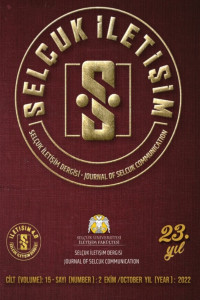Research Article
Issue Editorial Board





 Web
Web





 Web
Web
Doç. Dr.






 Web
Web
Hacer Aker Selçuk Üniversitesi, Gazetecilik Bölümü’nde lisansını, Radyo, Televizyon ve Sinema Ana Bilim Dalı’nda master ve doktorasını tamamladı. Aynı bölümde öğretim üyesi olarak görev yapan yazar, Capitol Technology University’den siberpsikolog Mary Aiken ile ortak editörlü bir kitap çıkardı. Handbook of Research on Cyberchondria, Health Literacy, and the Role of Media in Society ’s Perception of Medical Information başlıklı kitap, Amerika’da yayınlandı. Yoksulluk, Kahkaha ve Sinema kitabının yazarı, Sinema ve Çocuk-I , Sinema ve Çocuk-2 ve Medya ve Toplumsal İnşa kitaplarının da editörlerinden olan Aker, Sinematik İmgelemde İntihar, Ötenazi ve Ölüm, Sinema ve Edebiyat Üzerine Yazılar, Toplumsal Cinsiyet ve Medya Algısı, Türk Sinemasında Kadınlık Halleri, Medyada Korku Kültürü Üzerine Eleştirel Yaklaşımlar, Digital Dönüşüm, İletişim Fark Yaratır, Derviş Zaim Sinemasını Anlamak: Anlatı, Zaman ve Mekan, Contemporary Issues in Cultural Studies ve Contemporary Issues in Arts adlı yayınlar başta olmak üzere birçok kitabın da bölüm yazarlarındandır. 2013 yılından itibaren Kısa-ca Uluslararası Öğrenci Filmleri Festival'inde düzenleme kurulu üyesi ve tören koordinatörü olarak görev alan yazar, ulusal/uluslararası bazda ödül kazanan çok sayıda öğrenci projesinin de danışmanlığını yürütmüştür. Sosyoloji, Filmlerle Felsefe, Film Eleştirisi, Sinemasal Düşünce, Sinema, Sokak Siyaseti ve İnsan İlişkileri, Kültürlerarası İletişim, Radyo Programcılığı ve Akademik Yazım ve Etik derslerini yürüten Aker, kamplarda yaşayan Suriyeli mülteciler üzerine katılımcı gözlem ve yarı-yapılandırılmış görüşme tekniklerinin kullanılacağı bilimsel bir proje hazırlığındadır. Bulguların bir kitapta derleneceği projede, belgesel çekimi de gerçekleştirilecektir. Politik sinema, felsefe, kültür politikaları, yoksulluk, göç, komedi, iletişim çalışmaları ve yeni iletişim teknolojileri yazınına ilgi duyan yazarın, matematik olimpiyatları ve kompozisyon yarışmalarında Türkiye birincilikleri, haber spikerliği dalında da ödülleri bulunmaktadır.
Aim & Scope
Journal of Selcuk Communication, which is the Academic Journal of Selcuk University Faculty of Communication, is a journal, thought, application-based research etc. on all communication sciences (public relations, advertising, journalism, radio, television and cinema etc.). It is an academic peer-reviewed journal that includes qualified articles. In this context, our journal, which includes scientific articles related to communication sciences and different disciplines, aims to contribute scientifically to the field of communication by presenting publications in accordance with academic standards.
Journal of Selcuk Communication is an academic, open-access, electronic and peer-reviewed journal published two times a year, in April and October. Studies submitted to the journal are pre-evaluated by the editorial board and the studies deemed appropriate are published with the positive reports of at least two referees. It is open to all articles and reviews in the field of media and communication studies.
Author Guidelines
WRITING RULES
1. All articles submitted to Journal of Selcuk Communication for evaluation should be prepared on the sample article template (click to download the article template). Once the article template has been downloaded, the texts should be adapted to the relevant parts of the template without any changes to the template. Papers that are not suitable for the template / prepared using the template will be returned to the author(s) without being evaluated. Other points to be considered are as follows:
- Papers submitted to Selcuk Communication Journal should be prepared by using MS Office Word program, in A4 size, with 2.5 cm margins from the right, left, top and bottom edges, in normal writing style, in Calibri font, with 0nk first, then 6nk, with 1.25 indentation on the first line, with 1.5 line spacing and both side justified.
- The Turkish and English titles of the papers should be written with the first letter of each word capitalized, left justified, and in 20 font size and bold.
- The name and surname of the author(s) should be written in Calibri 16 font size, normal and left justified.
- Öz and Abstract titles should be written in Calibri 12 font size and normal font style.
- Extended Abstract (Extended English/Turkish Abstract), Introduction, Conclusion, Bibliography and all other main headings should be written left justified, all capital letters, in 14 font size, 0 indented and bold. In the second level sub-headings, only the first letter of the words should be capitalized, left justified, in 14 font size, with 1.25 indentation on the first line and bold.
- Abstracts in Turkish and English should be written in 11 font size and normal style. Turkish and English keywords should be written in 11 font size with the first letters capitalized.
- Papers should generally follow the flow of Turkish Title, Abstract, Keywords, English Title, Abstract, Keywords, Introduction, Main Text, Conclusion, Extended English/Turkish Abstract and Bibliography.
- Papers should contain a minimum of 5000 words and a maximum of 9000 words, including extended abstracts.
- In each paper, Turkish and English abstracts should be included in the range of minimum 150 and maximum 250 words, and Keywords should consist of minimum 5 and maximum 7 words. Abstracts should be in English for studies prepared in Turkish, abstracts should be in Turkish for studies prepared in English. The prepared abstract should briefly include the purpose, scope, problem, method, universe/sample group of the study and the important findings and results obtained.
- The extended abstract should be written in English for studies written in Turkish, and in Turkish for studies written in English. The Extended Abstract in English/Turkish should consist of at least 750 and maximum 1500 words and should be written in 12 font size. The prepared abstract should be a holistic text containing the purpose, scope, theoretical framework, method, findings and results of the study and should include all relevant parts of the study. The Extended Abstract should be placed at the end of each work, just before the Bibliography, and the paper should be uploaded to the system as a single MS Word file.
2 . The 6th edition of APA (American Psychological Association), which is the method of referencing the text, should be used for referencing. In both the citations and the bibliography part, the authors should follow the spelling rules and format specified in the American Psychological Association Publication Guide published by the American Psychological Association. In this regard, the guide named "APA 6 Rules" Guide for Referencing in Scientific Publications, Table and Figure Creation" prepared by Turkish Librarians Association should be used. For Directory Access: www.tk.org.tr/APA/apa_2.pdf
3. The references in the articles sent to our journal must be created with the reference management tool in MS Office Word. Manual references and bibliography are not accepted. (Click to reach the informative video about MS Office Word reference management)
4. All legal responsibility for the content of the articles belongs to the author(s).
5. More than one article of the author (s) in one issue cannot be published.
6. The academic evaluation process can be run if the author(s) who upload an article in one call of our journal apply with a publication in a foreign language in the next call. (An author who uploads an article in the January call can only apply with an article in a foreign language in the April call.)
7. In each publication call period, only one article of the author(s) is included in the evaluation. In case of multiple uploads, only one work is included in the evaluation process. This condition is valid for both single author and multi-authored articles. There are no exceptions to this condition.
8. Articles submitted to our journal for publication must not have been sent to another journal or published in any media. In our journal, only articles produced from doctoral dissertations – with limited number - are evaluated. (Articles produced from doctoral dissertations, if peer-review process is completed, are placed in the order of publication and published in subsequent issues.)
9. Full texts of articles presented in scientific meetings (congresses, symposiums, etc.) can be sent to our journal, provided that they have not been published digitally or in print and converted into article format / content.
10. The number of articles to be published in each issue is determined by the editorial board and limited in number. The number of articles from various research type will in each issue is under the authority of the editorial board. For this reason, the articles that are accepted as a result of the peer-reviewing process are put in order and put on hold for the progressive issues. Studies uploaded in a foreign language are given priority regardless of the date of upload and acceptance. No commitment is made regarding the issue in which the accepted studies will be published.
11. Submission of articles to Journal of Selcuk Communication is made only through the DergiPark system. In order to submit an article to the journal, you must have a DergiPark user account and ORCID ID number.
12. In the main heading of the articles, expressions regarding the brand name, institution name and the object of examination (XX Brand Sample, XX Corporation Sample, XX Film Sample, XX Advertisement Sample) should not be included.
13. All articles submitted to our journal are checked for originality both before they are evaluated by the editorial board and after the peer-reviewing process is completed and the articles is included in the publication process.
14. The upper limit of the acceptable similarity rate for the studies submitted to our journal is 15%. Articles exceeding this limit will be rejected without being evaluated. Therefore, authors are required to determine the similarity rate before submitting their work to our journal. Since similarity programs work according to certain parameters, if there is a difference between the similarity rate of the author and the editorial board of Journal of Selcuk Communication, the rate of Journal of Selcuk Communication will be taken as basis. Before uploading to the relevant call of the journal, the authors who check the similarity are required to select the "no repository" option. Otherwise, since the similarity rate of the articles in editorial control will be displayed as 100%, the artcile will not be evaluated.
15. Since the articles for which revisions are requested during the peer-reviewing process are submitted to the referee review again regardless of the type of revision (minor / major), all required corrections in the articles must be marked in red and uploaded. For artciles not uploaded in this way, the peer-reviewing will be terminated and the article will be returned to the author.
16. If the author(s) use the note panel as a personal communication tool to the referee or use their anonymized identities to reveal their anonymized identities, the article will be rejected on the grounds of ethical violation and author(s) will be prevented from uploading an article to any call of the Journal of Selcuk Communication.
Ethical Principles and Publication Policy
Our journal undertakes to apply the highest standards of academic publication ethics and to comply with the following principles of the Publication Ethics and Malpractice Statement. This declaration was created on the basis of the recommendations and guidelines developed by the organizations named Committee on Publication Ethics (COPE), Council of Science Editors (CSE), World Association of Medical Editors (WAME) and International Committee of Medical Journal Editors (ICMJE).
The Board of Directors of the Journal acts with the awareness of the following ethical responsibilities:
• Editors are responsible for all processes of work submitted to the journal. In this context, the decision makers are editors, regardless of economic or political gains.
• The independent editor commits to making the decision.
•Journal of Selcuk Communication protects the property and copyright of every published article and undertakes the obligation to keep the records of every published copy.
• Has the responsibility to take precautions for all kinds of scientific misconduct, citation fraud and plagiarism regarding editors.
Price Policy
Derginin tüm giderleri Selçuk Üniversitesi İletişim Fakültesi tarafından karşılanmaktadır. Dergide makale yayını ve makale süreçlerinin yürütülmesi ücrete tabi değildir.


